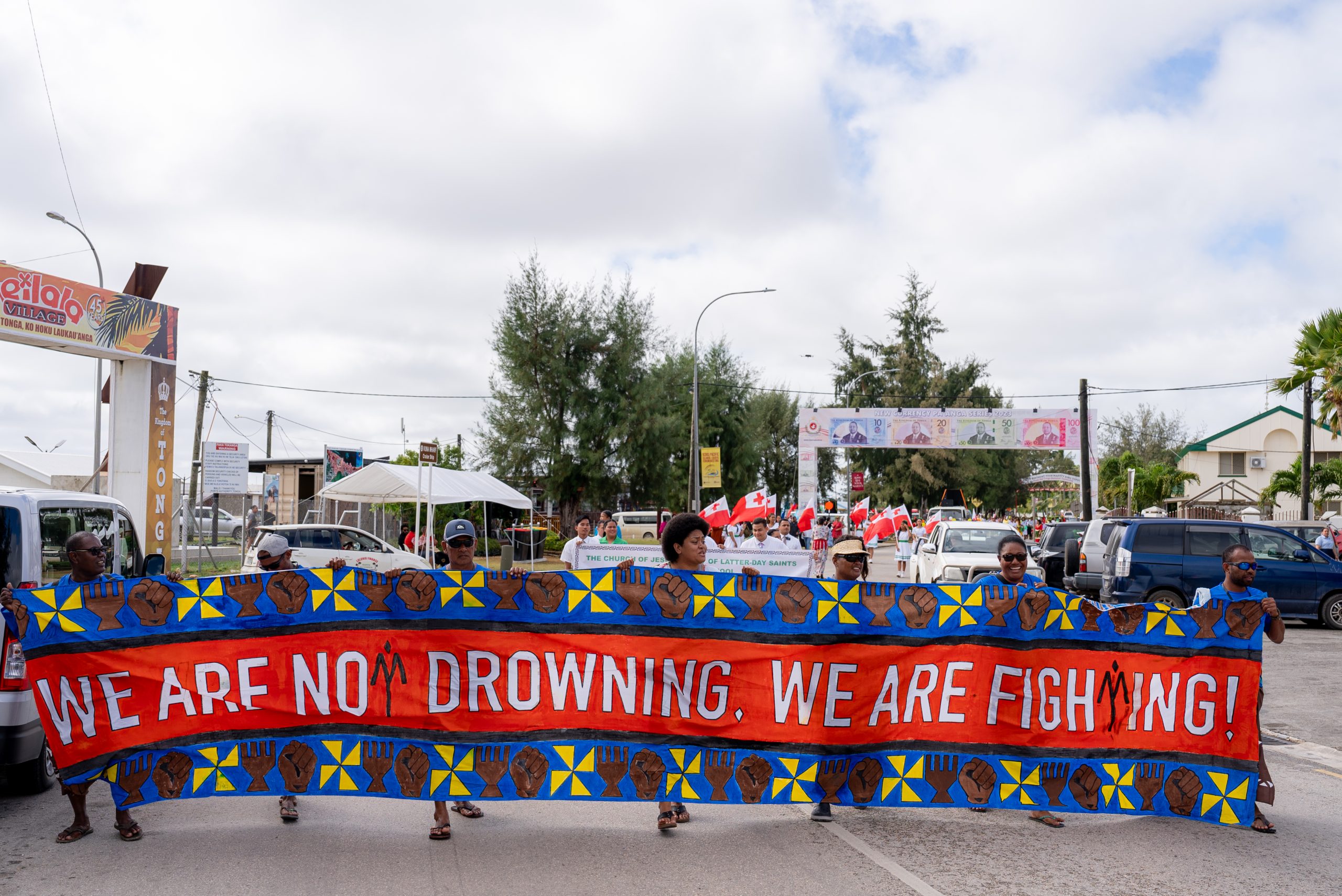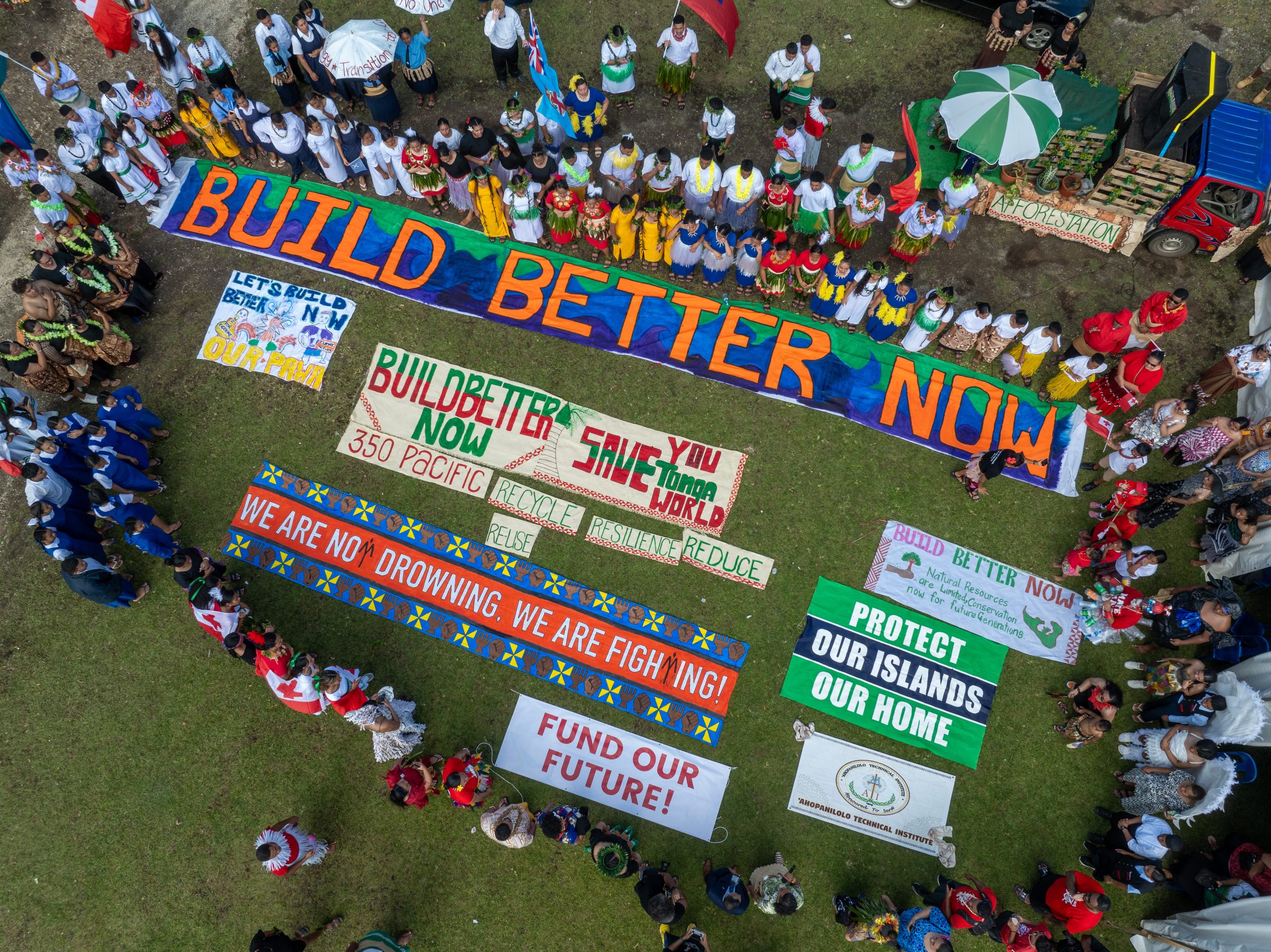A newly released report identified that accelerated sea level rise in the Pacific is alarmingly above the global average.
As the United Nations Secretary-General António Guterres and WMO Secretary-General Celeste Saulo launched the World Meteorological Organisation State of the Climate in the South-West Pacific 2023 report, hundreds of Pacific island youth took to the streets of Nuku’alofa today with the resounding chant of “We are not drowning, we are fighting.”
Jobod Silk, Pacific Climate Warrior from the Marshall Islands says, “There is no room for despair in this critical decade, so we will not stop fighting for genuine climate action. The coral atolls of the Marshall Islands islands are no stranger to the threats of sea level rise, and we are doing all that we can to adapt and build better to survive. It is time that the rest of the world do their part. The RMI National Adaptation Plan has the voices of hundreds of Marshallese youth engrained in it, and today we join Tongan youth on the streets, to let the world know that we are still here. All of the rich culture, biodiversity and heritage that you see represented on these streets, that is what the world stands to lose if we do not act now.”
In a creative demonstration of the Pacific Islands Forum’s theme “Build Better Now”, students and youth activists marched through the streets of Tonga in a celebration of resilience and culture. Students from Liahona High School, St. Andrew High School, Tupou High School, Ahopanilolo Technical Institute, Kaianuanu Catholic Youth, Siasi Tonga Houeiki Kolofo’ou Youth and traditional voyagers from the Uto ni Yalo Trust all joined the “Build Better Now” parade.

Joseph Sikulu, 350.org Pacific Managing Director says: “Receiving this report when we have leaders from the world’s third largest fossil fuel exporter on my home island is a painful irony. Australia needs to meet this moment with a sharp turnaround in their climate policy, from one of rhetoric to one of action. Promises of climate funds and domestic decarbonisation pale in comparison to the scale of coal exports and the shameful Future Gas Strategy that the Australian Federal government has proposed. The Pacific is taking the heat for a fossil fuel addiction the world over, and this Pacific Islands Forum Leaders meeting gives Australia the opportunity to signal the end of that addiction. Australia doesn’t need a groundbreaking new declaration, Pacific leaders have already provided them with the Boe Declaration and the plans for a Fossil Fuel Free Pacific. All they must do is follow the leadership shown by our islands and heed the alarm sounded by science. Commit to a fossil fuel phase out, not just of their own energy systems, but of their exports as well.”
Inangaro Vakaafi, Pacific Climate Warriors Council Elder says: “Any rise in sea level threatens Niue’s underground fresh water supplies and any rise in ocean temperatures threatens the biodiversity of our oceans and the ability to sustain ourselves. We’ve taken the initiative to protect over 40% of our waters under the Niue Moana Mahu Marine Protected Area, and the impacts of these marine heatwaves could jeopardise all of those efforts. With each step the Pacific takes forward to protect our islands, the climate crisis drives us back another five. I hope that the alarming information in this report is heard the world over, particularly by our fossil fuel producing neighbours present in this Pacific Forum.”
Savio Carvalho, 350.org Head of regions says: “The people of the Pacific are responsible for a mere 0.02% of global emissions, whilst the investments of just 125 billionaires emit 393 million tonnes of CO2e each year – the equivalent of France. It is outrageous that the people of these islands bear the brunt of the climate crisis whilst those perpetuating this injustice go scot free. The time for climate action was yesterday – we must continue to fight and pressure the Industrialised nations, the primary culprits of climate change, to urgently provide financial support for adaptation, loss and damage already incurred, and to enable a swift transition to renewable energy worldwide. The stakes could not be higher.














